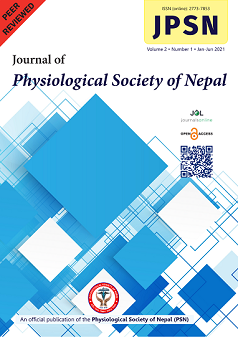Relationship between mindfulness and perceived stress in first year medical students of a medical college in Nepal: a cross-sectional observational study
DOI:
https://doi.org/10.3126/jpsn.v2i1.42590Keywords:
Medical students, Mindfulness, Perceived stress, Prevention, Stress managementAbstract
Introduction: Though mindfulness-based strategy is receiving attention to manage stress among medical students globally, role of mindfulness in the Nepalese context has not been studied. We aimed to study the relationship between perceived stress and trait mindfulness among first year medical students in a medical college in Nepal.
Materials and methods: An observational cross-sectional study was conducted in which all of the participants completed the structured self-administered questionnaire online. Mindfulness Attention Awareness Scale was used to assess trait mindfulness and Perceived Stress Scale to assess perceived stress. Information about some potential stressors was also collected. Simple correlation as well as multiple linear regression analysis supplemented with relative weight analysis were performed to study the relationships.
Results: Seventy-nine out of 99 first year medical students of the college participated in the study. Mean mindful attention awareness score was 3.88 (SD=0.78) and mean perceived stress score was 21.98 (SD=6.03). Perceived stress score correlated negatively and significantly with mindfulness score (Pearson’s r= -0.38, 95% CI= -0.56 to -0.18, p-value = 0.0005). Relative weight analysis also revealed significant and comparable (but in opposite direction) predictor roles of mindfulness and perceived academic course difficulty in prediction of perceived stress. However, sex, home country, perceived economic pressure, perceived peer pressure and perceived study environment adversity did not reach predictor significance in the relative weight analysis.
Conclusions: Trait mindfulness is a significant predictor of perceived stress among first year medical students in the Nepalese context. Higher mindfulness is associated with lower perceived stress.
Downloads
Downloads
Published
How to Cite
Issue
Section
License
Copyright (c) 2021 Journal of Physiological Society of Nepal

This work is licensed under a Creative Commons Attribution-NonCommercial 4.0 International License.

